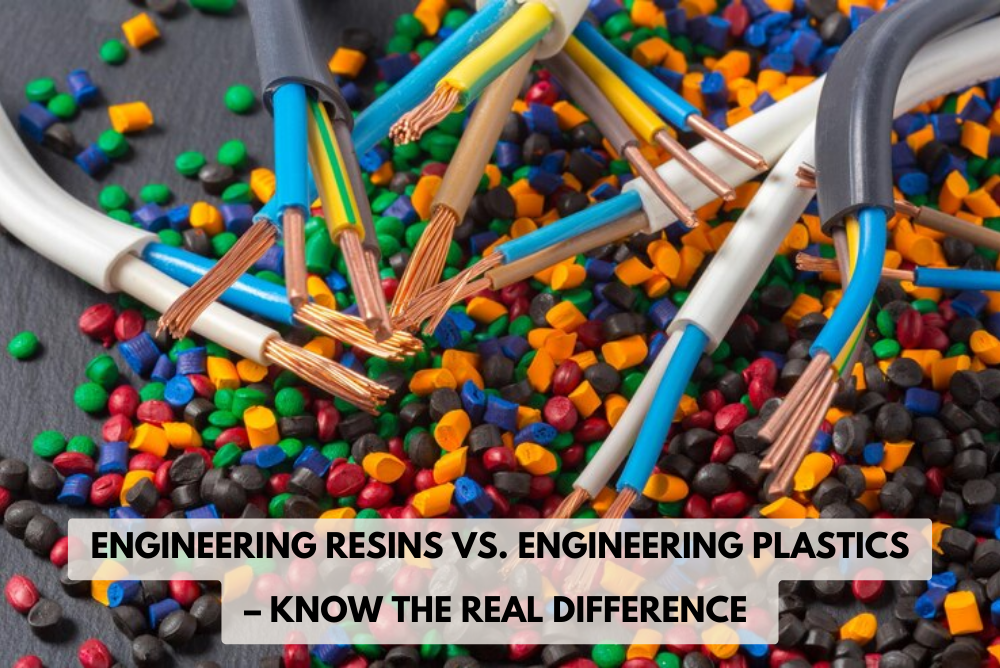The choice of materials in modern manufacturing plays a crucial role in determining the success and performance of engineered products. This is because the properties of the selected material—whether natural or modified—directly impact the product’s functionality, durability, and overall quality. Among the many materials available, engineering resins and plastics are two of the most widely used, each with its own set of advantages and applications. Although the terms are often used interchangeably, they are not the same. In this post, we’ll explore the key differences between engineering resins and engineering plastics to help you make informed decisions for your next project.

### Key Differences Between Engineering Resins and Engineering Plastics
While both engineering resins and plastics are polymers, they differ significantly in their chemical structure, performance characteristics, and application suitability. Here are the main factors that set them apart:
**1. Chemical Structure:**
Engineering resins typically have more complex molecular structures due to precise chemical synthesis processes. This complexity enhances their mechanical strength, thermal stability, and resistance to chemicals. In contrast, engineering plastics usually have simpler polymer chains, which can result in different performance traits. However, they still offer a good balance of properties for a wide range of applications.
**2. Thermal Stability:**
Engineering resins are known for their high heat resistance and dimensional stability, making them ideal for use in extreme temperature environments. They maintain their integrity even under thermal cycling. On the other hand, engineering plastics are suitable for moderate temperatures and may not perform as well in high-heat conditions.
**3. Mechanical Properties:**
Resins generally exhibit superior mechanical strength, toughness, and stiffness, making them ideal for high-stress or load-bearing applications. Engineering plastics, while not as strong, still provide excellent mechanical performance and are commonly used in various engineering fields.
**4. Processing Methods:**
Both materials can be processed using techniques like injection molding and extrusion. However, engineering resins often require more specialized methods to preserve their properties. Engineering plastics, on the other hand, are easier to process and are well-suited for large-scale production of intricate shapes.
**5. Chemical Resistance:**
Engineering resins tend to have better resistance to solvents, oils, and harsh chemicals, which makes them ideal for use in industries such as aerospace, automotive, and chemical processing. Engineering plastics may not withstand highly corrosive environments but are sufficient for applications requiring moderate chemical resistance.
**6. Cost Considerations:**
Engineering resins are generally more expensive than engineering plastics due to their advanced performance and specialized manufacturing. Engineering plastics are cost-effective and are often preferred when performance requirements are less demanding or when budget is a concern.
**7. Applications:**
Engineering resins like PEEK, PPS, and nylon are used in high-performance applications where strength, heat resistance, and durability are critical—such as in medical devices, aerospace components, and automotive systems. Engineering plastics, including ABS, PC, and PET, are commonly found in consumer electronics, automotive interiors, and packaging due to their balance of cost, aesthetics, and performance.
Understanding the difference between engineering resins and plastics allows engineers and designers to optimize their designs for efficiency, longevity, and cost-effectiveness. Whether you're working on an industrial or commercial project, selecting the right material is essential. If you need high-quality engineering resins or plastics, it's important to work with a trusted supplier. Mid Continent Plastics is a reliable source for a wide range of engineering materials. Their team of experts can guide you through the selection process based on your specific needs. Contact us today to learn more about how we can support your next project.

Pipe Reducing And Expanding Machine
Pipe Reducing And Expanding Machine,Tube End Forming Machine,Pipe Tapering Machine,Pipe Shrinking Machine
Zhangjiagang heshun machinery manufacturer co.,ltd. , https://www.hsformer.com